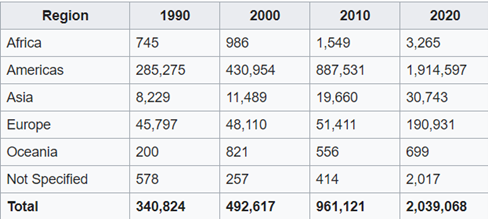This fact check examines the origin and authenticity of the statement “Mexico moves to require biometric data from cellphone users“, made in an ABC News article. The article says that Mexico’s Senate passed legislation to require biometric data from everyone who wants to buy a cellphone or use a mobile provider’s services in order to create a register to help fight crime in the country. The claim turns out to be true.
The topic is important from a European perspective because, reportedly, there are more than 190,000 EU citizens living in the Mexican Federation. Shortly before Mexico’s Senate’s decision, the European Commission had announced that a European citizens’ initiative to ban mass biometric surveillance would be registered. That’s why we decided to check the Mexican government’s decision which impacts the monitoring and privacy of mobile device users. The validation of this information was necessary because contradictory messages appeared in the media space.
In the ABC News article from April 15th, 2021 it is stated that “Mexico’s Senate passed legislation to require cellphone companies to gather customers’ biometric data“. The claim is factual, based on official information and its subject is clearly defined as the biometric data from cellphone users. The author of the claim is Mexico’s Senate and its claim was based on a primary source — the Ordinary session of the Senate.
The Senate of Mexico announced in its verified Twitter account that with 54 votes in favor, 49 against and 10 abstentions, the Federal Law of Telecommunications and Broadcasting was reformed and would lead to the establishment of a “National Register of Mobile Phone Users”.
Mexican President Andrés Manuel López Obrador reassured that this measure is “just a registry“ in favor of the population’s safety and that the government would “never spy on anybody“.
What happens in the field?
An interesting fact is that three months before the Mexico’s Senate’s decision, the European Commission had announced that it would register a European citizens’ initiative to ban mass biometric surveillance. The organizers of the initiative urge the EC to propose a bill to permanently end the indiscriminate and arbitrary use of biometric data in ways that could lead to mass surveillance or illegal interference related to fundamental rights. This initiative is in total conflict with the decision made in Mexico.
A group of 40 MEPs in the European Parliament urged EU lawmakers to outlaw automated recognition of people’s sensitive characteristics (such as gender, sexuality, race/ethnicity, health status and disability) — warning that such AI-fueled practices pose too great a rights risk.
The MEPs wrote in an open letter to the Commission that “biometric mass surveillance technology in publicly accessible spaces is widely being criticized for wrongfully reporting large numbers of innocent citizens, systematically discriminating against under-represented groups and having a chilling effect on a free and diverse society. This is why a ban is needed”.
On April 16th, 2021 a legal provision was published online in the Official Journal of the Federation of Mexico, which made the Senatre’s decision an effective decree. It says that The Federal Law of Telecommunications and Broadcasting has been changed. All the details around the newly added “National Register of Mobile Phone Users” are thoroughly described.
Foreigners in Mexico
We would like to note that it is confusing how all the European countries are struggling to limit the mass biometric surveillance while at the same time Mexico’s Senate passed legislation in favor of it.
How will it affect foreign citizens living in Mexico? We tried to find official statistics about how many foreigners are living in Mexico, but we couldn’t find a source other than Wikipedia. According to it, there are around one million foreign-born people residing in the Federation, and more than 190,000 of them are EU citizens. When we tried to check Wikipedia’s references to confirm the number, we couldn’t find the information we needed in the links. Regardless of that, there are EU citizens living in the country, no matter the number.

Table 1. Screenshot of the Immigration to Mexico by region. [Photo]. In: Wikipedia, 14.05.2021 [cited 18.05.2021]. https://en.wikipedia.org/wiki/Immigration_to_Mexico
This would set the question: Does the GDPR EU law apply here to protect its citizens in a so-called by the law third-party country (a term used in GDPR to refer to countries outside of the EU and EEA)? In Chapter 2, Art. 5 e. it is written: “Personal data shall be … kept in a form which permits identification of data subjects for no longer than is necessary…” This sentence, which more or less summarizes the GDPR, is in direct conflict with the new change in the Mexican law. There is still no information about the rights of the EU citizens and it is unclear how the EU will respond.
Conclusion
In short, we can conclude that the topic of biometric data and its surveillance is very important in global perspective for the citizens. The changes made in the Mexican legislation are confirmed despite the fact that they raise some questions concerning their future impact on the European citizens and other foreigners living there. Nevertheless, the claim in the article remains true.
RESEARCH | ARTICLE © Anna Avramova, Plamena Todorova, Petya Georgieva, Sofia University “St. Kliment Ohridski”, BG
Leave your comments, thoughts and suggestions in the box below. Take note: your response is moderated.





